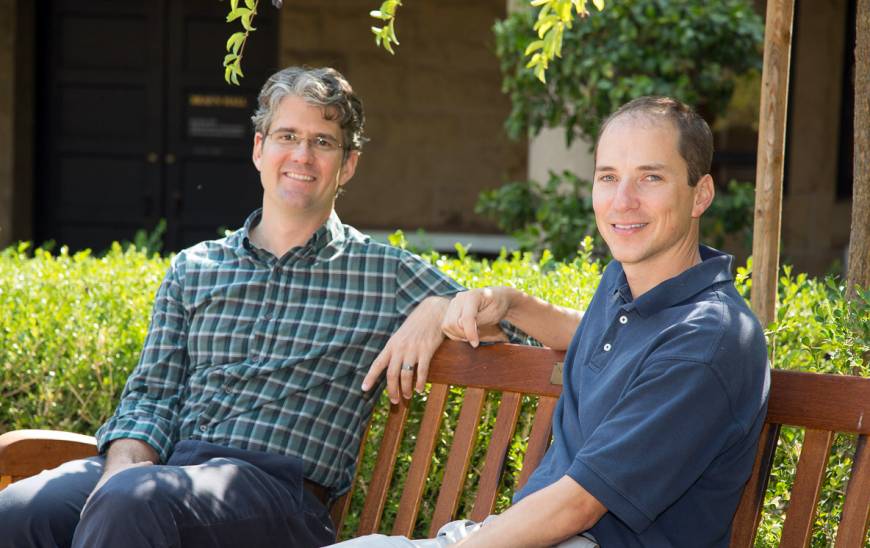The Stanford School of Earth, Energy & Environmental Sciences is now part of the Stanford Doerr School of Sustainability.
This page is currently being maintained for archival purposes only. For the latest information, please visit us here.
Stanford ‘Geniuses’ Reflect Back
Earth Sciences professors Kevin Boyce and David Lobell discuss the unexpected benefits of winning 2013 MacArthur Fellowships.
By
Ker Than
Stanford School Of Earth Sciences
September 11, 2014

Credit: Stacey Geiken
For David Lobell, it began with one incredulous phone call last summer. The woman on the line said she was with MacArthur Foundation, and was calling to congratulate him for being one of two dozen individuals to win a 2013 MacArthur Fellowship.
Lobell, an agricultural ecologist and an associate professor of environmental Earth system science, had heard of the prestigious award, but he was skeptical. “I was not 100 percent sure it was the same award that I'd heard about, so I started Googling it while she was on the phone,” said Lobell, who in addition to his faculty position is deputy director of the Center on Food Security and the Environment at Stanford.
Kevin Boyce, a paleobotanist and an associate professor of geological and environmental sciences, received a similar call, and reacted with a similar sense of disbelief. Over the next several weeks, Lobell and Boyce were besieged by congratulatory phone calls, emails, and requests for interviews. For Boyce, seeing the term “paleobotany” frequently mentioned in the popular media was a surreal experience. “I really enjoyed that because it is not exactly something you hear people discussing in the street,” he said.
The MacArthur Fellowship, popularly known as the “Genius Grant,” is awarded annually by the John D. and Catherine T. MacArthur Foundation to between 20 to 40 U.S. citizens or residents who “show exceptional merit and promise for continued and enhanced creative work.” It includes a “no strings attached” $625,000 grant that is received over five years. The new crop of winners is slated to be announced next week, and a MacArthur Fellows reunion event is set to take place in Chicago on October 23, which Lobell and Boyce both plan to attend.
The Foundation recognized Boyce for “establishing links between ancient plant remains and present-day ecosystems through a pioneering and integrative approach to evolutionary plant biology.” Lobell was singled out for “unearthing richly informative, but often underutilized sources of data to investigate the impact of climate change on crop production and global food security.” Both are faculty members in the Stanford School of Earth Sciences.
The media frenzy came at a somewhat awkward time for Boyce, as he had just moved to Stanford after a decade at the University of Chicago, and was still settling in. His bare bones office proved a challenge when the MacArthur Foundation sent a video crew to produce a short film about him. “They had to take everything I had and cram it all together to make a little sliver of an actual office for the video,” Boyce said. “There’s also a scene where I’m studying a fossil specimen. Well, we had to flip the fossil around so viewers couldn’t see that it’s not actually a plant fossil, but rather a fossil clam that I borrowed from a teaching collections. My fossils, and the rest of my lab, were still packed in crates in the hallway of Geo Corner.”
Upon learning that he was an award recipient, Boyce went into research mode and looked up past winners. He read books they authored and watched their video interviews. He was especially interested in how other MacArthur winners handled, or in some cases dodged, the question of how they planned to spend their grant money. It’s a tricky question that every winner is asked, and one that Boyce particularly dreaded–with good reason it turned out. “One reporter kept asking me if I was going to buy a sports car with the money,” Boyce recalled. (Spoiler: He hasn’t, and doesn’t plan to.)
Both Lobell and Boyce say that the real benefit of the award for them has not been monetary, but something more intangible and, for a scientist, perhaps more valuable: a renewed confidence in the creative approach to scientific research and the risk-taking mentality that attracted the attention of the MacArthur Foundation in the first place.
Like many scientists, Boyce says he is fueled primarily by his curiosity about the world. While his research, which involves the study of extinct and living plants across multiple timescales, does have implications for understanding the evolution of plants and Earth’s climate through the ages, he says it’s not why he became a scientist. “I just think that time, and the Earth, are interesting,” he said. “The MacArthur Award is a validation of that approach to science.”
For Lobell, the MacArthur grant helps him pursue projects “even if they are risky and may not work out.” One of his current projects, for example, involves mining Google’s vast database of satellite images and devising ways to use that trove of information for agricultural research. “It’s a resource that hasn’t been tapped yet, and there’s no real funding sources I could have had for that before,” he said. “It’s kind of risky because I don’t know how useful it’ll be, but I have this hunch that it’ll be really useful.”
Lobell suspects that having the MacArthur Award may have helped when he first contacted Google about his idea. “Sure, they don’t expect Stanford professors to be slouches,” he said, “but being a MacArthur fellow is an extra stamp of approval that means people tend to take you more seriously."
The MacArthur Fellowship has meant new opportunities for Boyce as well. “I’ve gotten more out-of-the-blue emails from people who want to collaborate with me,” Boyce said. “I haven’t chosen to participate in any of them yet, but I do appreciate knowing about the opportunities.”
Boyce also credits the publicity from the award for an interview with Popular Mechanics, in which he was asked to pick the worst science fiction movie ever made (Boyce watched a lot of classic sci-fi movies as a graduate student at Harvard: “It was an important part of my education,” he said.) Boyce singled out the 1961 film Voyage to the Bottom of the Sea for its gross scientific inaccuracy. “The ice cap melts, and ice chunks sink and hit the sub,” Boyce said.
For Lobell, news of the MacArthur Award followed shortly on the heels of learning that he would be receiving tenure at Stanford and getting approval for a six month-long sabbatical in Australia. The close timing of all three events prompted Lobell to take a step back and rethink his research goals. “It freed me up to think about what do I consider to be really important, and what I can do to really make an impact in my field over the course of my career,” he said. “In a sense, I’m still in that mode.”
While Boyce has used some of the grant for daycare for his children, he hasn’t yet decided what he wants to do with the rest. Like Lobell, the award has given Boyce a chance to regroup. One possibility is using part of the grant to fund a research trip to the tropics. “It’s something that I’ve needed to do,” Boyce said. “In recent years, I have been working on rain forest evolution, but haven’t actually traveled much in the tropics since the priority is always going to be what makes the most sense for the kids. Now, the thought of taking everybody along to Costa Rica for a month or even commuting back and forth is much more plausible.”
Lobell studied applied mathematics at Brown University, and before receiving his bachelor's degree in 2000, he spent the summer of 1999 as a research intern at Stanford, developing remote sensing algorithms. He then pursued graduate studies at Stanford, receiving his doctorate in geological and environmental sciences in 2005. He was a postdoctoral fellow at Lawrence Livermore National Laboratory from 2005-2007, and returned to Stanford as a senior research scholar in the Program on Food Security and the Environment in 2008-2009. He accepted an appointment as assistant professor in the Stanford School of Earth Sciences in 2009. He currently serves as deputy director of the Program on Food Security and the Environment, a joint program of the Freeman Spogli Institute and the Stanford Woods Institute for the Environment.
Boyce received dual degrees in literature and biology from the California Institute of Technology in 1995. He received his doctorate in paleontology in 2001 from Harvard University. From 2001 to 2003, he held a National Research Council Associateship with the NASA Astrobiology Institute. Prior to joining Stanford as a tenured professor, he was on the faculty of the University of Chicago from 2003-13, most recently as an associate professor of geophysical sciences.
Ker Than is associate director of communications for the School of Earth Sciences.



